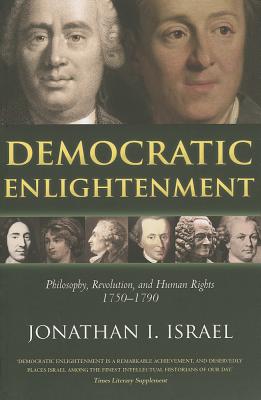

 Oxford University Press, USA
Oxford University Press, USA
Democratic Enlightenment: Philosophy, Revolution, and Human Rights, 1750-1790


Key Metrics
- Jonathan Israel
- Oxford University Press, USA
- Paperback
- 9780199668090
- 9.2 X 6.3 X 2.4 inches
- 3.5 pounds
- Philosophy > History & Surveys - Modern
- English
 Secure Transaction
Secure TransactionBook Description
In Democratic Enlightenment, Israel demonstrates that the Enlightenment was an essentially revolutionary process, driven by philosophical debate. The American Revolution and its concerns certainly acted as a major factor in the intellectual ferment that shaped the wider upheaval that followed, but the radical philosophes were no less critical than enthusiastic about the American model. From 1789, the General Revolution's impetus came from a small group of philosophe-revolutionnaires, men such as Mirabeau, Sieyes, Condorcet, Volney, Roederer, and Brissot. Not aligned to any of the social groups represented in the French National assembly, they nonetheless forged la philosophie moderne-in effect Radical Enlightenment ideas-into a world-transforming ideology that had a lasting impact in Latin America, Canada and Eastern Europe as well as France, Italy, Germany, and the Low Countries. In addition, Israel argues that while all French revolutionary journals powerfully affirmed that la philosophie moderne was the main cause of the French Revolution, the main stream of historical thought has failed to grasp what this implies. Israel sets the record straight, demonstrating the true nature of the engine that drove the Revolution, and the intimate links between the radical wing of the Enlightenment and the anti-Robespierriste Revolution of reason.
Author Bio
Jonathan Israel’s work is concerned with European and European colonial history from the Renaissance to the eighteenth century. His recent work focuses on the impact of radical thought (especially Spinoza, Bayle, Diderot, and the eighteenth-century French materialists) on the Enlightenment and on the emergence of modern ideas of democracy, equality, toleration, freedom of the press, and individual freedom.
His books include European Jewry in the Age of Mercantilism, 1550–1750 (1985); The Dutch Republic: Its Rise, Greatness, and Fall, 1477–1806 (1995); Radical Enlightenment: Philosophy and the Making of Modernity, 1650–1750 (2001); Enlightenment Contested: Philosophy, Modernity, and the Emancipation of Man 1670–1752 (2006); and A Revolution of the Mind: Radical Enlightenment and the Intellectual Origins of Modern Democracy (2009).
Source: Institute for Advanced Study
Videos
No Videos
Community reviews
Write a ReviewNo Community reviews